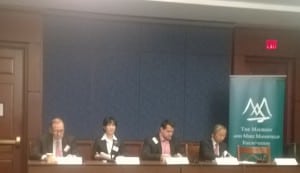Japan Eager to Work with U.S. on Defense Space Programs

The U.S.-Japan Space Forum panel discussion hosted by the Maureen and Mike Mansfield Foundation. Photo: Via Satellite.
[Via Satellite 12-18-2015] Japan’s political shift to enable greater non-aggressive defense capabilities could further spur the country’s competencies in space, and tighten relations with the United States, experts believe. In a panel discussion hosted Dec. 10 by the Maureen and Mike Mansfield Foundation, influencers in U.S. and Japanese space policy pointed out ways Japan’s new freedom in pursuing defense technology could lead to greater collaborations between the two nations.
Japan and the U.S. are already strong allies in many regards, but joint activities in space have largely been limited to the International Space Station (ISS). Though this involvement is not to be downplayed — as Japan is the only South Asian member of the ISS; the country is, and has been capable of increasing its presence in space through new satellites.
“Until 2008, no use of space for national and international security purposes was allowed,” said Setsuko Aoki a professor at Keio University who is an expert on outer space law. “For instance, the Self-Defense Forces of Japan (JSDF) couldn’t own or operate satellites. But now the Self Defense Forces are planning to have three X-band defense communications satellites, and the first of which is to be launched probably next year, and by 2020 Self Defense Forces is to have three such satellites [in orbit].”
Aoki also highlighted Japan’s Information Gathering Satellites (IGS), a remote sensing program that is now allowed to capture higher resolution imagery. Prior to the 2008 political reform, Japan was limited to resolutions available to civilians. Aoki said that with this constellation, expected to grow to 10 satellites, Japan can share resources with its signature ally: the United States. Japanese satellites also provide an opportunity for resiliency by distributing payloads on multiple spacecraft. Aoki said this is feasible in the future.
“Now Japan can use outer space for international and national security purposes, so hosted payloads with an ally is possible,” she said, adding that interoperability should also be a focus. “Japan can complement GPS capability by using Japan’s Quasi Zenith Satellite System (QZSS), and Japan is going to have seven of such by 2023. So the change of Japan’s legal system from nonmilitary to non-aggressive, Japan can go into more peaceful uses of outer space to protect space,” she added.
In a previous panel, Japan’s Director General of the Office of National Space Policy Yoshinori Komiya said that Japan’s space industry grew in such a way that it was geared toward scientific work almost exclusively, resulting in an absence of manufacturing cycles that lead to industry growth. Masakazu Toyoda, chairman and CEO of the Institute of Energy Economics Japan (IEEJ), and former secretary general of Japan’s Strategic Headquarters for Space Policy, reiterated this point saying that specifically eliminating defense from Japan’s space capabilities prevented the nation’s industry from amassing knowledge needed to make commercially competitive space technology.
“Before 2008 — before [the] Space Basic Law was enacted in Japan — security was not an area for cooperation, and because of that, commercial cooperation was not an area for substantiation, because if you are simply focused on the scientific area, you have to need to develop ‘new technology, new technology, new technology’ every time. So you didn’t need the cost reductions, but with security, for instance, QZSS we are trying to have seven satellites, and by doing that we could reduce the cost of making satellites,” he said.
Toyoda said much of the collaboration between the U.S. and Japan is one-way, largely dominated by interactions where American companies supply components to Japanese companies. He said two bills making their way through the Japanese government on launch indemnification and commercial remote sensing could balance this relationship.
Scott Pace, director of the Space Policy Institute, Elliot School of International Affairs at George Washington University, said that Japan, as a co-equal partner with the U.S. and as a space fairing nation, can help build greater order among international regimes, particularly in space.
“What are the opportunities in space cooperation? The opportunities are not simply about doing more science and commerce, or even national security work, per se. The opportunities are to the extent we join together to be order-building powers in a world beset by disorder,” he said.
At the conference, Space Situational Awareness (SSA) was an area repeatedly cited as an opportunity for the U.S. and Japan to team up. Topics include both space debris and concerns about anti-satellite technology, which in addition to destroying high value assets, would also exacerbate the debris issue. Here, Aoki pointed out that Japan has strengths of its own that the U.S. could benefit from.
“It is true that the United States has one of the best space surveillance networks, but yet because of geographic problems, there are some areas that SSA is not covering sufficiently, and that is above North East Asia. And here is Japan. Japan has capability, and of course it has to be augmented, but Japan has capability, intention, and geographical advantages for this point,” she said.